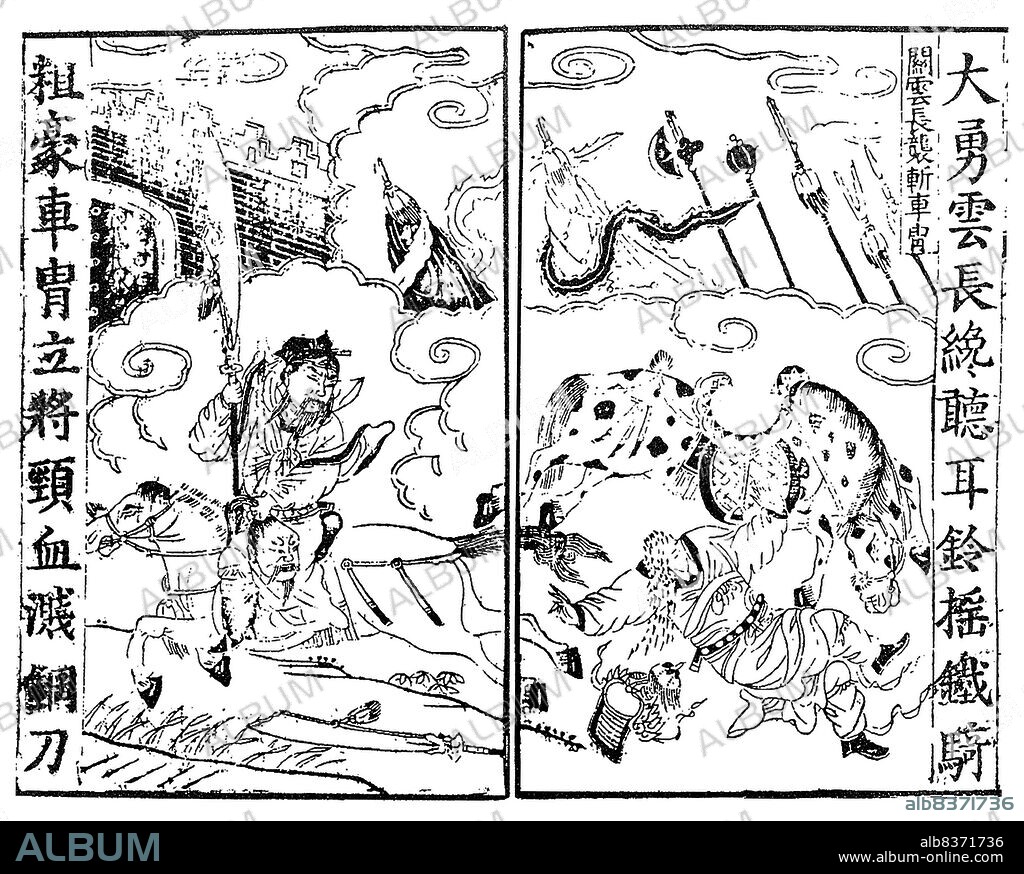alb8371736
China: Using the host's forces, Guan Yu (-220 CE) takes Xuzhou. From a Ming Dynasty edition of 'Romance of the Three Kingdoms'

|
Añadir a otro lightbox |
|
Añadir a otro lightbox |



¿Ya tienes cuenta? Iniciar sesión
¿No tienes cuenta? Regístrate
Compra esta imagen.
Selecciona el uso:

Título:
China: Using the host's forces, Guan Yu (-220 CE) takes Xuzhou. From a Ming Dynasty edition of 'Romance of the Three Kingdoms'
Descripción:
Ver traducción automática
Guan Yu (-220 CE), style name Yunchang, was a general serving under the warlord Liu Bei in the late Eastern Han Dynasty of China. He played a significant role in the civil war that led to the collapse of the Han Dynasty and the establishment of the state of Shu Han in the Three Kingdoms period, of which Liu Bei was the first emperor.
. As one of the best known Chinese historical figures throughout East Asia, Guan's true life stories have largely given way to fictionalised ones, most of which are found in the historical novel 'Romance of the Three Kingdoms' or passed down the generations, in which his deeds and moral qualities have been lionised. Guan is respected as an epitome of loyalty and righteousness.
. Guan was deified as early as the Sui Dynasty and is still worshipped by many Chinese people today, especially in southern China, Taiwan, Hong Kong, and among many overseas Chinese communities. He is a figure in Chinese folk religion, popular Confucianism, Taoism, and Chinese Buddhism, and small shrines to Guan are almost ubiquitous in traditional Chinese shops and restaurants.
. As one of the best known Chinese historical figures throughout East Asia, Guan's true life stories have largely given way to fictionalised ones, most of which are found in the historical novel 'Romance of the Three Kingdoms' or passed down the generations, in which his deeds and moral qualities have been lionised. Guan is respected as an epitome of loyalty and righteousness.
. Guan was deified as early as the Sui Dynasty and is still worshipped by many Chinese people today, especially in southern China, Taiwan, Hong Kong, and among many overseas Chinese communities. He is a figure in Chinese folk religion, popular Confucianism, Taoism, and Chinese Buddhism, and small shrines to Guan are almost ubiquitous in traditional Chinese shops and restaurants.
Crédito:
Album / Universal Images Group / Pictures From History
Autorizaciones:
Tamaño imagen:
4985 x 3997 px | 57.0 MB
Tamaño impresión:
42.2 x 33.8 cm | 16.6 x 13.3 in (300 dpi)
Palabras clave:
ART • ARTE • ARTES • ASIA • ASIATICO • CHINA • CHINO • DEIDAD • DIBUJO • DINASTIA MING • DIOS DE LA GUERRA • DIOS GUERRA • DIOS • DIOSES • DIVINIDAD • ILUSTRACION • MING • RELIGION • TAOISMO • TAOÍSTA
 Pinterest
Pinterest Twitter
Twitter Facebook
Facebook Copiar enlace
Copiar enlace Email
Email
